高一英语一般将来时
英语高一必修一语法
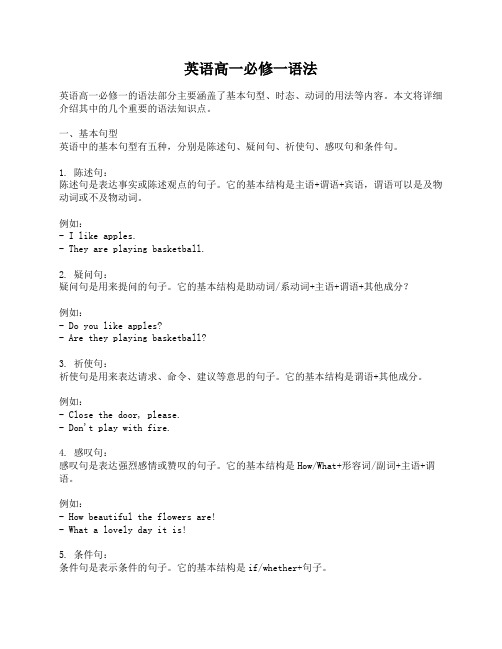
英语高一必修一语法英语高一必修一的语法部分主要涵盖了基本句型、时态、动词的用法等内容。
本文将详细介绍其中的几个重要的语法知识点。
一、基本句型英语中的基本句型有五种,分别是陈述句、疑问句、祈使句、感叹句和条件句。
1. 陈述句:陈述句是表达事实或陈述观点的句子。
它的基本结构是主语+谓语+宾语,谓语可以是及物动词或不及物动词。
例如:- I like apples.- They are playing basketball.2. 疑问句:疑问句是用来提问的句子。
它的基本结构是助动词/系动词+主语+谓语+其他成分?例如:- Do you like apples?- Are they playing basketball?3. 祈使句:祈使句是用来表达请求、命令、建议等意思的句子。
它的基本结构是谓语+其他成分。
例如:- Close the door, please.- Don't play with fire.4. 感叹句:感叹句是表达强烈感情或赞叹的句子。
它的基本结构是How/What+形容词/副词+主语+谓语。
例如:- How beautiful the flowers are!- What a lovely day it is!5. 条件句:条件句是表示条件的句子。
它的基本结构是if/whether+句子。
例如:- If it rains tomorrow, we will stay at home.- Whether she comes or not, I will go to the party.二、时态在英语中,时态用于表示动作发生的时间。
高一必修一中涵盖了一般现在时、一般过去时、一般将来时等几个基本时态。
1. 一般现在时:一般现在时用于表示经常性的动作、习惯、真理、科学事实等。
它的基本结构是主语+谓语。
例如:- She goes to school every day.- Water boils at 100 degrees Celsius.2. 一般过去时:一般过去时用于表示过去发生的动作或状态。
北师大版高一英语语法(必修一-必修

北师大版高一英语语法(必修一-必修四)必修一一、一般现在时和现在进行时1,一般现在时e:反复进行的,经常性的动作(惯例或习惯)Eg, He watches soap operas.及状态I live in Beijing.一般现在时常和下列时间状语连用:always, usually, from, time to time, twice a week, rarely,seldom, once a month, never.2,现在进行时:说话时正在进行的动作(现在,此刻)一定时间段内经常进行的动作和现在进行时连用的时间状语有just, now, at the moment, at present.二、一般将来时:将来的安排和打算1、be going to表示打算要做的事情。
2、现在进行时表示已经确定或安排好事情。
Eg,I’m getting married in June.3、一般现在是表示不可改变的官方活动或时间表The summer term begins on the 15thofFebruary.三、一般过去时和过去进行时1,一般过去时:表示过去完成的动作或过去的情境和习惯。
Eg: She climb the stairs and went to her room.用一般过去时要在规则动词词尾加-ed,或用不规则动词的过去式,一般过去式的疑问句和否定句用did和didn’t加动词原形。
2、过去进行时:过去某段时间正在进行的动作形成某些事件发生的情境动作。
Eg, It was raining during the whole match.当过去进行时和一般过去时出现在同一个句子中时,过去进行时描述故事发生的背景,儿一般过去时则报道该事件。
Eg,We driving along a country lane when, suddenly a car drove past us.Form:过去进行时的结构是:主语+was /were +动词-ing形式。
高一英语必修一知识点归纳整理【优秀10篇】
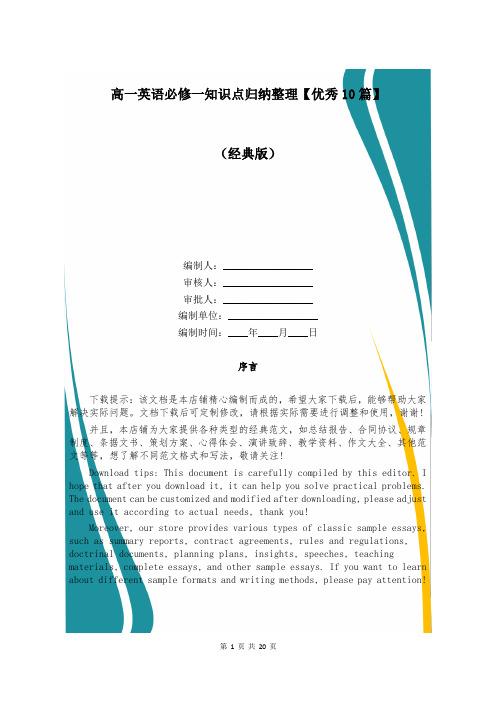
高一英语必修一知识点归纳整理【优秀10篇】(经典版)编制人:__________________审核人:__________________审批人:__________________编制单位:__________________编制时间:____年____月____日序言下载提示:该文档是本店铺精心编制而成的,希望大家下载后,能够帮助大家解决实际问题。
文档下载后可定制修改,请根据实际需要进行调整和使用,谢谢!并且,本店铺为大家提供各种类型的经典范文,如总结报告、合同协议、规章制度、条据文书、策划方案、心得体会、演讲致辞、教学资料、作文大全、其他范文等等,想了解不同范文格式和写法,敬请关注!Download tips: This document is carefully compiled by this editor. I hope that after you download it, it can help you solve practical problems. The document can be customized and modified after downloading, please adjust and use it according to actual needs, thank you!Moreover, our store provides various types of classic sample essays, such as summary reports, contract agreements, rules and regulations, doctrinal documents, planning plans, insights, speeches, teaching materials, complete essays, and other sample essays. If you want to learn about different sample formats and writing methods, please pay attention!高一英语必修一知识点归纳整理【优秀10篇】在课堂上我们一定要全神贯注,在认真听讲和合作探究的过程中,掌握知识、技能和方法。
高一英语语法大全

一、动词的时态:
一般现在时:表示经常、反复发生的动作或存在的状态,常与always, often, usually等时间状语连用。
现在进行时:表示现在正在进行的动作,由“be(am/is/are)+现在分词”构成。
一般将来时:表示将来要发生的动作或状态,常与tomorrow, next year等时间状语连用。
二、动词的语态:
被动语态:表示主语是动作的承受者,由“be+过去分词”构成。
主动语态:表示主语是动作的执行者。
三、非谓语动词:
不定式:表示具体的、一次性的动作,可用作主语、宾语、表语等。
动名词:表示抽象的、经常性的动作,可用作主语、宾语等。
分词:现在分词表示主动、进行,过去分词表示被动、完成。
四、句子种类:
陈述句:用来陈述事实或观点的句子。
疑问句:用来提出问题的句子。
祈使句:用来表示请求、命令、建议等的句子。
感叹句:用来表达强烈感情的句子。
五、句子成分:
主语:句子中的主要名词或代词,表示句子所说的是“谁”或“什么”。
谓语:句子中的主要动词,表示主语所做的动作或所处的状态。
宾语:句子中的动词所作用的名词或代词,表示动作的对象或结果。
定语:修饰名词或代词的词或词组,表示名词的性质、特征等。
状语:修饰动词、形容词、副词或整个句子的词或词组,表示动作发生的时间、地点、方式等。
高一第一册英语总结知识点
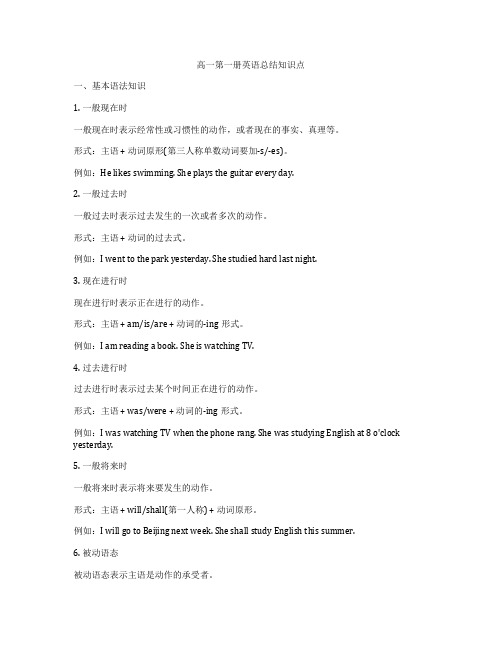
高一第一册英语总结知识点一、基本语法知识1. 一般现在时一般现在时表示经常性或习惯性的动作,或者现在的事实、真理等。
形式:主语 + 动词原形(第三人称单数动词要加-s/-es)。
例如:He likes swimming. She plays the guitar every day.2. 一般过去时一般过去时表示过去发生的一次或者多次的动作。
形式:主语 + 动词的过去式。
例如:I went to the park yesterday. She studied hard last night.3. 现在进行时现在进行时表示正在进行的动作。
形式:主语 + am/is/are + 动词的-ing形式。
例如:I am reading a book. She is watching TV.4. 过去进行时过去进行时表示过去某个时间正在进行的动作。
形式:主语 + was/were + 动词的-ing形式。
例如:I was watching TV when the phone rang. She was studying English at 8 o'clock yesterday.5. 一般将来时一般将来时表示将来要发生的动作。
形式:主语 + will/shall(第一人称) + 动词原形。
例如:I will go to Beijing next week. She shall study English this summer.6. 被动语态被动语态表示主语是动作的承受者。
形式:主语 + am/is/are + 动词的过去分词。
例如:The book is read by me. The cake was eaten by the children.7. 可数名词和不可数名词可数名词是指可以用数目来计算的名词。
不可数名词是指不能以数目计算的名词。
例如:book/books, water, rice。
高一英语语法总结大全

高一英语语法总结大全以下是一些高一英语语法的总结:1. 一般现在时:表示经常性的行为或客观事实。
例如:I eat breakfast every day.2. 一般过去时:表示过去发生的动作或状态。
例如:She went to the park yesterday.3. 现在进行时:表示现在正在进行的动作。
例如:I am studying for my English test.4. 过去进行时:表示过去某个时间点正在进行的动作。
例如:She was cooking dinner when I arrived.5. 将来时:表示将来要发生的动作或状态。
例如:I will go to the concert tomorrow.6. 现在完成时:表示过去某个时间到现在已经完成的动作。
例如:I have finished my homework.7. 过去完成时:表示过去某个时间之前已经完成的动作。
例如:She had already left when I arrived.8. 一般将来时:表示将来某个时间将要发生的动作。
例如:We will visit the museum next week.9. 客观性的情态动词:can, may, must, should等。
表示能力、许可、必要性、建议等。
例如:You should study harder for your exams.10. 主观性的情态动词:would, could, might, should等。
表示意愿、请求、推测等。
例如:I would like to go to the movies tonight.这只是一小部分高一英语语法的总结,还有很多其他重要的语法规则和用法需要学习。
建议通过参考教材和语法书籍来全面学习和理解英语语法规则。
高中英语不定式与将一般将来时讲义
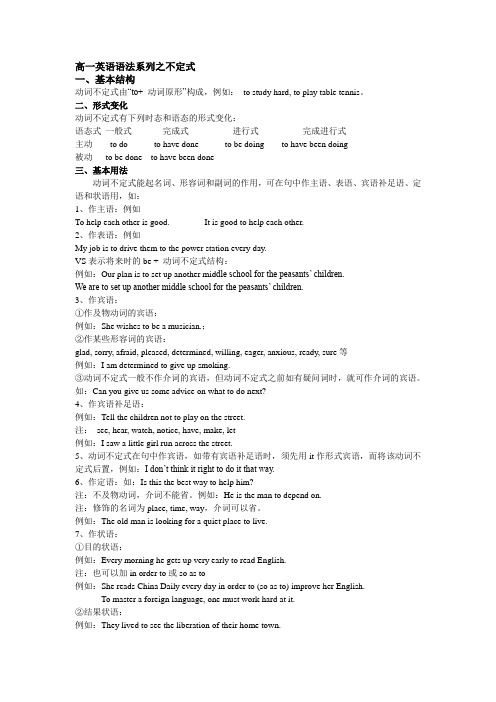
高一英语语法系列之不定式一、基本结构动词不定式由“to+ 动词原形”构成,例如:to study hard, to play table tennis。
二、形式变化动词不定式有下列时态和语态的形式变化:语态式一般式完成式进行式完成进行式主动to do to have done to be doing to have been doing被动to be done to have been done三、基本用法动词不定式能起名词、形容词和副词的作用,可在句中作主语、表语、宾语补足语、定语和状语用,如:1、作主语:例如To help each other is good. It is good to help each other.2、作表语:例如My job is to drive them to the power station every day.VS表示将来时的be + 动词不定式结构:例如:Our plan is to set up another mid dle school for the peasants’ children.We are to set up another middle school for the peasants’ children.3、作宾语:①作及物动词的宾语:例如:She wishes to be a musician.;②作某些形容词的宾语:glad, sorry, afraid, pleased, determined, willing, eager, anxious, ready, sure等例如:I am determined to give up smoking.③动词不定式一般不作介词的宾语,但动词不定式之前如有疑问词时,就可作介词的宾语。
如:Can you give us some advice on what to do next?4、作宾语补足语:例如:Tell the children not to play on the street.注:see, hear, watch, notice, have, make, let例如:I saw a little girl run across the street.5、动词不定式在句中作宾语,如带有宾语补足语时,须先用it作形式宾语,而将该动词不定式后置,例如:I don’t think it right to do it that way.6、作定语:如:Is this the best way to help him?注:不及物动词,介词不能省。
高一英语一般将来时单选题30题

高一英语一般将来时单选题30题1. I think my sister ______ a doctor in the future.A. will beB. isC. wasD. has been答案:A。
本题考查一般将来时的“will + 动词原形”结构。
选项B 是一般现在时,选项C 是一般过去时,选项D 是现在完成时,都不符合“in the future(在未来)”这个时间状语所暗示的将来时态,所以应该选择A。
2. Our school ______ a sports meeting next month.A. will haveB. hasC. hadD. is having答案:A。
“next month((下个月)”表明要用一般将来时,“will + 动词原形”,have a sports meeting 是“举办运动会”,B 选项has 是一般现在时,C 选项had 是一般过去时,D 选项is having 是现在进行时表将来,但是next month 要用will have,所以选A。
3. My father ______ back from Beijing in two days.A. will comeB. comesC. cameD. has come答案:A。
“in two days((两天后)”是一般将来时的时间标志,要用“will + 动词原形”,come back 是“回来”,B 选项comes 是一般现在时,C 选项came 是一般过去时,D 选项has come 是现在完成时,都不符合,故选A。
4. They ______ to the zoo if it doesn't rain tomorrow.A. will goB. goC. wentD. have gone答案:A。
“if it doesn't rain tomorrow((如果明天不下雨)”,从句用一般现在时,主句用一般将来时,“will + 动词原形”,go to the zoo 是“去动物园”,B 选项go 是一般现在时,C 选项went 是一般过去时,D 选项have gone 是现在完成时,所以选A。
高一必备英语一般将来时技巧全解及练习题(含答案)

高一必备英语一般将来时技巧全解及练习题(含答案)一、单项选择一般将来时1.—Help me out in the kitchen and I ________ you to a cup of coffee.—Sounds good.A.will treat B.treatC.am treating D.have treated【答案】A【解析】考查时态。
句意:——要是你在厨房里帮我忙的话,我将请你喝咖啡。
——听起来不错。
根据对话语境可知,应用一般将来时。
2.It is only with the help of scientific research _____ bring PM1 air pollution under control. A.that we will B.we willC.that we do D.do we【答案】A【解析】试题分析:考查强调句结构。
强调句的结构为it + be + 强调部分 + that从句。
此题强调状语only with the help of scientific research。
句意:只有在科学研究的帮助,我们将PM1空气污染得到控制。
故A正确。
考点:考查强调句结构3.The students have been working hard on their lessons and their efforts _____ with success in the end.A.rewarded B.were rewardedC.will reward D.will be rewarded【答案】D【解析】【分析】【详解】本题考查时态和语态。
解题步骤:1. 确定时态:根据句尾的in the end可知,事情发生在将来,用将来时。
2. 确定语态:efforts和reward是被动关系,应该使用被动语态。
句意:学生们一直在刻苦学习功课,他们的努力终将会得到回报。
【英语】高一英语一般将来时技巧和方法完整版及练习题及解析

【英语】高一英语一般将来时技巧和方法完整版及练习题及解析一、单项选择一般将来时1.— Tom! I forgot to bring my notebook this morning.—Don’t worry! I it for you.A.will get B.gets C.am getting D.am going to get 【答案】A【解析】试题分析:句意:--汤姆,别忘了今天早上把我的笔记本带来。
--别担心,我会给你带来的。
这里是用一般将来时,will do表示“愿意做,临时决定”,一般现在时代替一般将来时是用于时刻表中即将做…,现在进行时代替一般将来时是表示“马上做”,用于表示移动的动作,be going to则是表示“计划,安排”,所以选A。
考点:考查时态2.— Did you tell Mother you have passed the exam?— Oh, I forgot. I _______ her now.A.will call B.will be callingC.am calling D.am to call【答案】A【解析】试题分析:考查情态动词。
句意是:你告诉Rose关于考试的事了吗?--哦,我忘了,我现在就打电话给她。
这里用will表示临时决定,故选A项。
考点 : 考查情态动词3.—Your windows are still open? It's so cold!—Oh, sorry. They ________.A.aren't closing B.won't doseC.won't be closed D.aren't closed【答案】B【解析】试题分析:考查close的用法。
由题目可知,不是回答者不关窗,而是窗子由于种种原因(窗子坏了)关不了,they指代窗户为主语,因此为主动。
Close既可作及物动词,又可作不及物动词,此句中为不及物动词,句意为你的窗户还是开的,真是太冷的。
高一英语上册知识点全部

高一英语上册知识点全部在高一英语上册的学习中,我们学习了许多基础的语法知识和词汇。
下面将对这些知识点进行整理和总结。
一、动词时态和语态:1. 一般现在时:表示经常性的动作、习惯、客观事实等。
例句:She often goes to school by bus.2. 现在进行时:表示现阶段正在进行的动作。
例句:I am reading a book now.3. 一般过去时:表示过去某个时间发生的动作或状态。
例句:He played soccer yesterday.4. 过去进行时:表示在过去某个时间正在进行的动作。
例句:I was watching TV when my mother came back.5. 一般将来时:表示将来某个时间要发生的动作或存在的状态。
例句:We will have a picnic next Sunday.6. 完成时态(包括现在完成时、过去完成时和将来完成时):表示过去发生的动作对现在或将来造成的影响。
例句:She has lived in Beijing for five years.7. 被动语态:强调动作的承受者而不是执行者。
例句:The book was written by Mark Twain.二、名词性从句:名词性从句可以作为主语、宾语或表语,引导词常见的有:that, if, whether, who, whom, whose, which, what等。
例句:What he said is true.三、形容词和副词的比较级和最高级:1. 比较级:表示两个事物之间的比较。
例句:My house is bigger than yours.2. 最高级:表示三个或三个以上事物之间的比较。
例句:He is the tallest student in our class.四、情态动词:情态动词用来表示一种能力、允许、可能性等。
常见的情态动词有:can, could, may, might, must, shall, should, will, would等。
高一英语一般将来时专项训练100(附答案)

高一英语一般未来时专项训练100( 附答案 )一、单项选择一般未来时1.A kind of newly-made shoes, if put into the market, _________ large orders because the heels can switch from 4 to 9 centimeters.A. meets B.will meetC. has met D. met【答案】 B【分析】B观察动词时态。
句意:一种新款的鞋一旦投入市场,将会接到大批的订单,由于这类鞋的鞋跟高度能够在 4 到 9 厘米之间变化。
If 指引的状语从句,主句表示未来,从句用此刻时取代未来时。
光临 B 正确。
2.— I was very angry with Kelvin yesterday.— I know your feelings, but if you forgive him, you ______ a bigger man.A. will be B.have beenC. would be D. were【答案】 A【分析】试题剖析:观察时态。
本句观察时态。
If 从句中常用一般此刻时表未来,此时主句中应使用一般未来时。
依据这一用法,本题选择A。
考点:观察时态3.Turn on the television or open a magazine and you ________ advertisements showing happy families.A. will often see B.often seeC. are often seeing D. have often seen【答案】 A【分析】观察“祈使句 +and +陈说句”句型。
祈使句相当于一个条件状语从句,and 后的陈说句的谓语用一般未来时,这是一个较为固定的句型。
4.Only when you can find peace in your heart _____good relationships with others.A. will you keep B. you will keep C. you kept D. did you keep【答案】 A【分析】试题剖析:观察倒装构造用法。
高一期中考试英语知识点
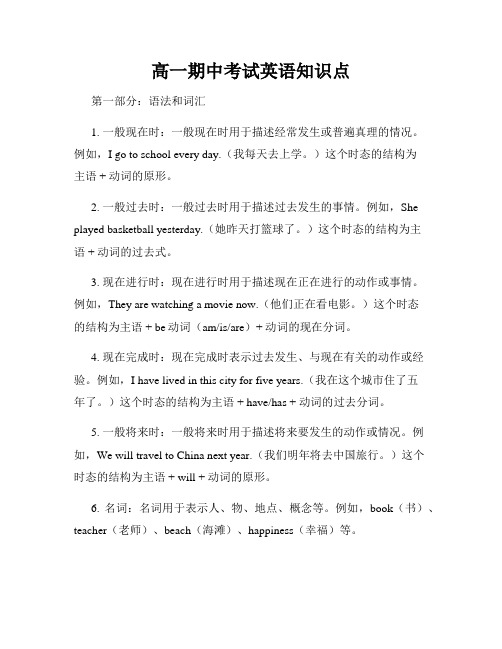
高一期中考试英语知识点第一部分:语法和词汇1. 一般现在时:一般现在时用于描述经常发生或普遍真理的情况。
例如,I go to school every day.(我每天去上学。
)这个时态的结构为主语 + 动词的原形。
2. 一般过去时:一般过去时用于描述过去发生的事情。
例如,She played basketball yesterday.(她昨天打篮球了。
)这个时态的结构为主语 + 动词的过去式。
3. 现在进行时:现在进行时用于描述现在正在进行的动作或事情。
例如,They are watching a movie now.(他们正在看电影。
)这个时态的结构为主语 + be动词(am/is/are)+ 动词的现在分词。
4. 现在完成时:现在完成时表示过去发生、与现在有关的动作或经验。
例如,I have lived in this city for five years.(我在这个城市住了五年了。
)这个时态的结构为主语 + have/has + 动词的过去分词。
5. 一般将来时:一般将来时用于描述将来要发生的动作或情况。
例如,We will travel to China next year.(我们明年将去中国旅行。
)这个时态的结构为主语 + will + 动词的原形。
6. 名词:名词用于表示人、物、地点、概念等。
例如,book(书)、teacher(老师)、beach(海滩)、happiness(幸福)等。
7. 动词:动词用于表示行为或状态。
例如,run(跑)、sleep(睡觉)、study(学习)等。
8. 形容词:形容词用于修饰名词。
例如,beautiful(美丽的)、happy(快乐的)、big(大的)等。
9. 副词:副词用于修饰动词、形容词、副词等。
例如,quickly(快速地)、happily(快乐地)、very(非常)等。
第二部分:阅读理解阅读理解是英语考试中的重要部分。
它要求学生通过阅读文章来回答问题、找出关键信息、推断意义等。
一般将来时英语定义

一般将来时在英语中用于表示将要发生的动作或状态,以及对将来事件的预测、计划或打算。
它通常与表示未来时间的词或短语一起使用,如tomorrow(明天)、next week(下周)、in the future(将来)等。
在结构上,一般将来时主要有以下两种形式:
1. 使用助动词"will" 或"shall" 加动词原形构成,例如:
- I will go to the gym tomorrow. (我明天会去健身房。
)- She shall complete her project by next month. (她会在下个月完成她的项目。
)
2. 使用"be going to" 结构,即主语+ am/is/are + going to + 动词原形,例如:
- We are going to have a meeting at 3 pm. (我们将在下午3点开会。
)
- He is going to study abroad next year. (他明年打算出国留学。
)
另外,在某些情况下,现在进行时也可以表示按计划或安排即将发生的未来事件,这被称为“未来进行时”的用法。
高一英语语法(2-3):动词的时态之一般将来时、过去将来时和将来完成时
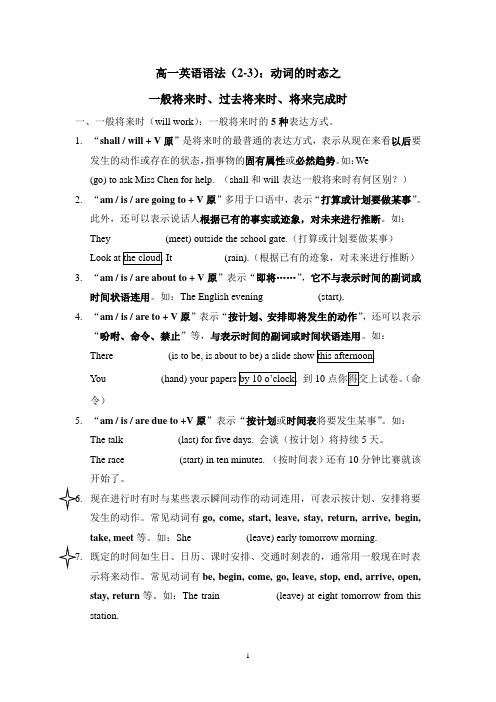
高一英语语法(2-3):动词的时态之一般将来时、过去将来时、将来完成时一、一般将来时(will work):一般将来时的5种表达方式。
1.“shall / will + V原”是将来时的最普通的表达方式,表示从现在来看以后要发生的动作或存在的状态,指事物的固有属性或必然趋势。
如:We __________ (go) to ask Miss Chen for help. (shall和will表达一般将来时有何区别?)2.“am / is / are going to + V原”多用于口语中,表示“打算或计划要做某事”。
此外,还可以表示说话人根据已有的事实或迹象,对未来进行推断。
如:They __________ (meet) outside the school gate.(打算或计划要做某事)(根据已有的迹象,对未来进行推断)3.“am / is / are about to + V原”表示“即将……”,它不与表示时间的副词或时间状语连用。
如:The English evening __________ (start).4.“am / is / are to + V原”表示“按计划、安排即将发生的动作”,还可以表示“吩咐、命令、禁止”等,与表示时间的副词或时间状语连用。
如:到10(命令)5.“am / is / are due to +V原”表示“按计划或时间表将要发生某事”。
如:The talk __________ (last) for five days. 会谈(按计划)将持续5天。
The race __________ (start) in ten minutes. (按时间表)还有10分钟比赛就该开始了。
现在进行时有时与某些表示瞬间动作的动词连用,可表示按计划、安排将要发生的动作。
常见动词有go, come, start, leave, stay, return, arrive, begin, take, meet等。
高一英语一般将来时及将来时间的表示法
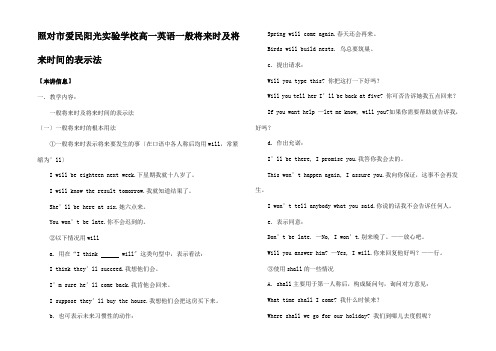
The plane takes off at 7︰30 tonight.飞机今晚七点半起飞。
③一般现在时表示按方案要发生的事,特别是以事物作主语时〔a〕,以人为主语时有时也可以这样用〔b〕:
a.The plane takes off in ten minutes.飞机十分钟后起飞。
照对市爱民阳光实验学校高一英语一般将来时及将来时间的表示法
【本讲信息】
一.教学内容:
一般将来时及将来时间的表示法
〔一〕一般将来时的根本用法
①一般将来时表示将来要发生的事〔在口语中各人称后均用will,常紧缩为’ll〕
I will be eighteen next week.下星期我就十八岁了。
I will know the result tomorrow.我就知道结果了。
A. do B. will do
C. going to do D. will doing
( ) 18. Tomorrow he ________ a kite in the open air first, and then ________ boating in the park.
A. will fly; will go B. will fly; goes
( ) 16. Who ________ we ________ swimming with tomorrow afternoon?
A. will; go B. do; go
C. will; going D. shall; go
( ) 17. We ________ the work this way next time.
职高英语高一下册书一般将来时句子(一)
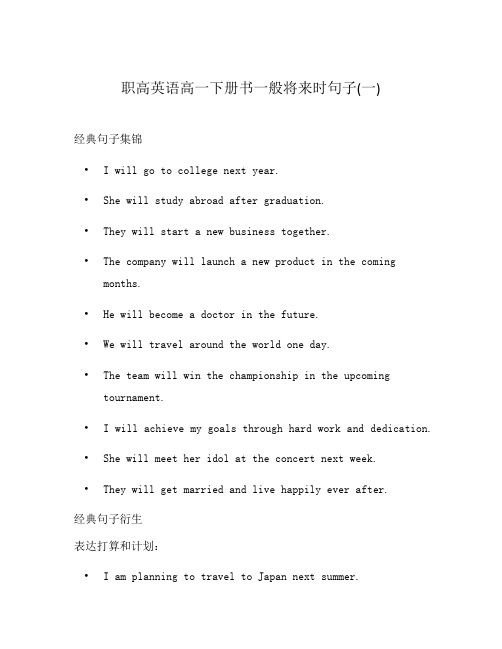
职高英语高一下册书一般将来时句子(一)经典句子集锦•I will go to college next year.•She will study abroad after graduation.•They will start a new business together.•The company will launch a new product in the coming months.•He will become a doctor in the future.•We will travel around the world one day.•The team will win the championship in the upcoming tournament.•I will achieve my goals through hard work and dedication. •She will meet her idol at the concert next week.•They will get married and live happily ever after.经典句子衍生表达打算和计划:•I am planning to travel to Japan next summer.•She is thinking about pursuing a career in music. •They are considering starting their own business.•The company is contemplating expanding into new markets. •He is intending to take a gap year before going to college.表达预测和推测:•I think it will rain tomorrow.•She believes that technology will continue to advance rapidly.•They expect the economy to grow steadily in the next few years.•The experts predict that the population will increase by 10% in the next decade.•He is confident that they will win the competition.表达希望和愿望:•I hope to achieve great success in my career.•She wishes to find true love and happiness.•They dream of traveling to outer space one day.•The company aspires to become a global leader in its industry.•He longs for a world without poverty and inequality.表达承诺和决心:•I am determined to overcome any obstacles and reach my goals.•She is committed to making a positive impact on society. •They are dedicated to providing the best customer service.•The company is resolved to reduce its carbon footprint. •He promises to always be there for his friends and family.表达预定计划和安排:•I have already booked my flight for next month.•She has scheduled a meeting with her clients for tomorrow.•They have arranged a trip to the beach for the weekend. •The company has set a launch date for the new product.•He has planned a surprise party for his best friend’s birthday.表达意愿和意图:•I would like to improve my language skills.•She wants to learn how to play the piano.•They hope to win the championship this year.•The company intends to expand its operations globally. •He is interested in starting his own business someday.表达可能性和不确定性:•I might go to the concert if I can get tickets.•She could become a famous actress with her talent.•They may take a vacation to Europe next summer.•The company might consider merging with a competitor. •He could be promoted to a higher position in the company. 表达习惯和经常性动作:•I always go for a run in the morning.•She often volunteers at the local animal shelter.•They usually have dinner together as a family.•The company regularly holds team-building activities. •He frequently travels for business meetings.表达条件和假设:•If it rains, we will have to cancel our outdoor plans. •She would be happy if she got accepted into her dream university.•They will travel to the beach if the weather is nice. •The company will invest more if the project shows promising results.•He will buy a new car if he saves enough money.表达命令和建议:•You should start studying for the exam in advance.•She ought to focus on improving her communication skills. •They had better complete the project by the deadline. •The company needs to invest in marketing strategies for better promotion.•He must follow the instructions to ensure safety.表达约定和协议:•We have agreed to meet at the café tomorrow.•She has promised to help me with my project.•They have decided on a budget for the event.•The company has signed a contract with a new supplier. •He has made a commitment to attend the meeting.以上是关于职高英语高一下册书一般将来时的相关句子。
最新高一英语一般将来时技巧和方法完整版及练习题

最新高一英语一般将来时技巧和方法完整版及练习题一、单项选择一般将来时1.It's really time I went home but I'm enjoying myself, so I ________ here a bit longer.A.am staying B.have stayedC.stayed D.stay【答案】A【解析】句意:尽管我现在该回家了,但我现在玩得正高兴,因此再多呆会儿。
动词stay可以用进行时表示将来的动作,故选A项。
2. How happy we are!The winter holiday we have been looking forward ____soon.A.has come B.to have comeC.to coming D.to will come【答案】D【解析】【详解】考查时态。
句意:我们真开心啊!我们一直期待的寒假很快就要来了。
本句中定语从句的先行词是the winter holiday,关系代词that/which指代先行词在句中作为动词短语look forward to的宾语,被省略掉了。
句中的come是谓语动词。
根据句意可知,寒假还没有到来,故用一般将来时。
故D正确。
考点:考查句子结构和时态3.Only when you can find peace in your heart _____good relationships with others.A.will you keep B.you will keep C.you kept D.did you keep【答案】A【解析】试题分析:考查倒装结构用法。
only修饰句子的状语(从句)位于句首时,句子的主句要用部分倒装。
结构为:only+状语/状语从句+ be/ 助动词/情态动词+主语。
根据从句的can可以排除D项。
句意:只有当你在你心中找到宁静的时候,你才会与其他人保持好的关系。
高一英语一般将来时技巧(很有用)及练习题及解析
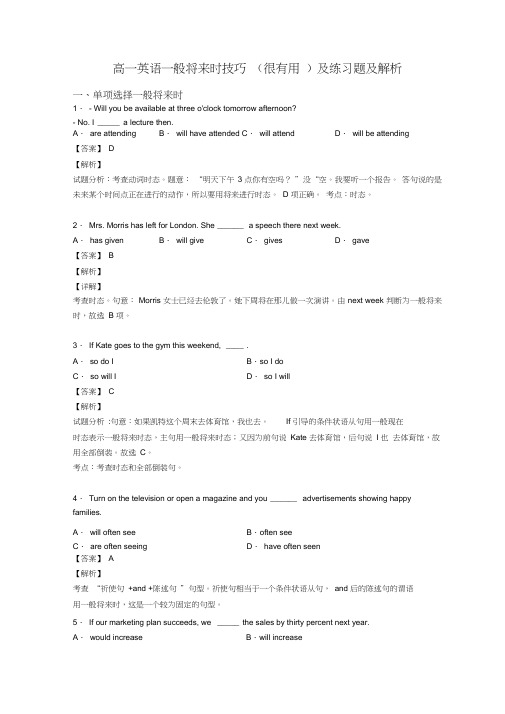
高一英语一般将来时技巧(很有用)及练习题及解析一、单项选择一般将来时1.- Will you be available at three o'clock tomorrow afternoon?- No. I _____ a lecture then.A.are attending B.will have attended C.will attend D.will be attending【答案】D【解析】试题分析:考查动词时态。
题意:“明天下午3 点你有空吗?”没“空。
我要听一个报告。
答句说的是未来某个时间点正在进行的动作,所以要用将来进行时态。
D 项正确。
考点:时态。
2.Mrs. Morris has left for London. She ______ a speech there next week.A.has given B.will give C.gives D.gave【答案】B【解析】【详解】考查时态。
句意:Morris 女士已经去伦敦了。
她下周将在那儿做一次演讲。
由next week 判断为一般将来时,故选 B 项。
3.If Kate goes to the gym this weekend, ____ .A.so do I B.so I doC.so will I D.so I will【答案】C【解析】试题分析:句意:如果凯特这个周末去体育馆,我也去。
If 引导的条件状语从句用一般现在时态表示一般将来时态,主句用一般将来时态;又因为前句说Kate 去体育馆,后句说I 也去体育馆,故用全部倒装。
故选C。
考点:考查时态和全部倒装句。
4.Turn on the television or open a magazine and you ______ advertisements showing happy families.A.will often see B.often seeC.are often seeing D.have often seen【答案】A【解析】考查“祈使句+and +陈述句”句型。
高一英语一般将来时及其被动式试题
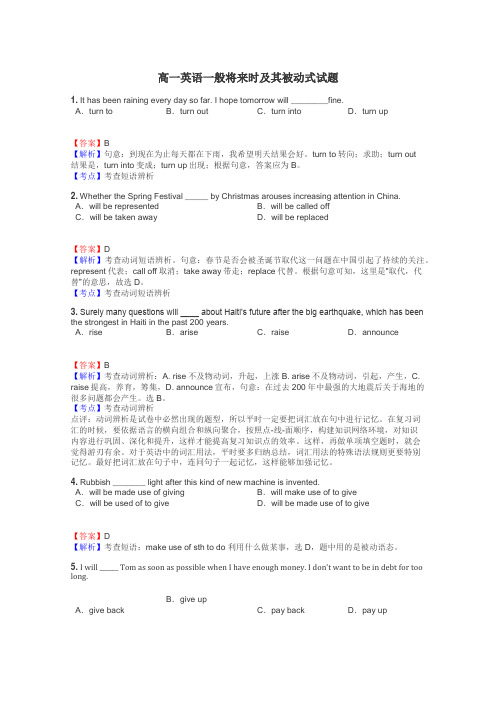
高一英语一般将来时及其被动式试题1. It has been raining every day so far. I hope tomorrow will ________fine.A.turn to B.turn out C.turn into D.turn up【答案】B【解析】句意:到现在为止每天都在下雨,我希望明天结果会好。
turn to转向;求助;turn out结果是,turn into变成;turn up出现;根据句意,答案应为B。
【考点】考查短语辨析2. Whether the Spring Festival _____ by Christmas arouses increasing attention in China.A.will be represented B.will be called offC.will be taken away D.will be replaced【答案】D【解析】考查动词短语辨析。
句意:春节是否会被圣诞节取代这一问题在中国引起了持续的关注。
represent代表;call off取消;take away带走;replace代替。
根据句意可知,这里是“取代,代替”的意思,故选D。
【考点】考查动词短语辨析3.Surely many questions will ____ about Haiti’s future after the big earthquake, which has been the strongest in Haiti in the past 200 years.A.rise B.arise C.raise D.announce【答案】B【解析】考查动词辨析:A. rise不及物动词,升起,上涨B. arise不及物动词,引起,产生,C. raise提高,养育,筹集,D. announce宣布,句意:在过去200年中最强的大地震后关于海地的很多问题都会产生。
- 1、下载文档前请自行甄别文档内容的完整性,平台不提供额外的编辑、内容补充、找答案等附加服务。
- 2、"仅部分预览"的文档,不可在线预览部分如存在完整性等问题,可反馈申请退款(可完整预览的文档不适用该条件!)。
- 3、如文档侵犯您的权益,请联系客服反馈,我们会尽快为您处理(人工客服工作时间:9:00-18:30)。
一、一般将来时讲解一般将来时表示将来某一时刻的动作或状态,或将来某一段时间内经常的动作或状态。
常常和表示将来的时间状语连用。
如:tomorrow(明天),next week(下周);in the future (将来)等。
一般将来时由助动词shall(第一人称),will(第二、三人称)动词原形构成。
美国英语则不管什么人称,一律用will。
一般将来时基本句型肯定句:I/We shall/will go. You/He/She/They Will go.否定句:I/We shall/will not go. You/He/She/They Will not go.疑问句:Shall I/we go? Will you/he/she/they go?简略回答:(肯)Yes,主语shall/will (否) No,主语shall/will not特殊疑问句:一般将来时的特殊疑问句是将疑问词放在句首,后接一般疑问句(就主语提问时,以疑问词who开头的疑问词除外)----- why will you be here on sunday?-----I will have a meeting on sunday(对特殊疑问句要进行具体回答)二、一般将来时结构1)、常见结构1、will / shall 动词原形这种方法一般单纯地表示将来某个时间将要发生的动作或存在的状态。
will用于各种人称;shall只用于第一人称。
例如: I will / shall go to visit him next week. 下周我将去拜访他。
What time shall we go there tomorrow? 明天我们几点去那儿?2、be going to 动词原形be going to 相当于一个助动词(其中be有人称和数的变化),与它后面的动词原形一起构成谓语。
用来表示近期将要发生的动作或存在的状态,以及计划、安排、打算要做的事。
例如: There is going to be a football match this afternoon.今天下午将有一场足球赛。
2)、常用结构1、用于"I expect, I'm sure, I think, I wonder 宾语从句"中。
Don't worry about the exam. I'm sure you'll pass.不要担心这次考试,我确信你会通过的。
I wonder what will happen.我不知道将会发生什么事。
I don't think the test will be very difficult.我想这次测验不会太难。
2、用于"祈使句and陈术句"中。
Work hard and you will succeed.如果你努力,就会成功的。
Go at once and you will see her.马上去,你就会见到她了。
3、与表示时间或条件的状语从句连用。
I'll let you know as soon as he arrives.他一到我就通知你。
If you ask him, he will help you.如果你请他,他会帮助你的。
三、一般将来时- 用法(1)一般将来时表示将要发生的动作或情况。
例如:I will(shall) arrive tomorrow.我明天到。
Will you be free tonight? 你今晚有空吗?We won’t (shan’t) be busy this evening. 我们今晚不忙。
(2)在一般将来时的句子中,有时有表示将来时间的状语,有时没有时间状语,这时要从意思上判断是否指未来的动作或情况。
例如:Will she come? 她(会)来吗?We’ll only stay for two weeks. 我们只待两星期。
The meeting won’t last long. 会开不了多久。
(3)在以第一人称I或we作主语的问句中,一般使用助动词shall,这时或是征求对方的意见(a),或是询问一个情况(b):a. Where shall we meet? 我们在哪儿碰头?b. Shall we have any classes tomorrow?明天我们有课吗?在这类问句中,近年来也有不少人用will,特别是在美国。
例如:How will I get there? 我怎么去?(4)be going to 动词原形a.表示打算、准备做的事。
例如:We are going to put up a building here.我们打算在这里盖一座楼。
How are you going to spend your holidays?假期你准备怎样过?b.表示即将发生或肯定要发生的事。
例如:I think it is going to snow. 我看要下雪了。
There’s going to be a lot of trouble about this. 这事肯定会有很多麻烦。
三组将来时间表示法的用法比较一、“will / shall+动词原形”与“be going to+动词原形”两者均可表示将来时间和意图,有时可以换用。
如:I think it’ll rain this evening. / I think it’s going to rain this evening. 我想今晚会下雨。
I won’t tell you about it. / I’m not going to tell you about it. 我不会把这事告诉你的。
两者的区别是:1. 若是强调某个意图是经过事先考虑好的,则通常要用be going to;若是表示某个意图没有经过事先考虑,而是在说话的当时才临时想到的,则通常用will。
比较:—Ann is in hospital. 安住院了。
—Oh, really? I didn’t know. I’ll go and visit h er. 啊,真的吗?我还不知道。
我要去看看她。
(临时想法,不能用be going to)—Ann is in hospital. 安住院了。
—Yes, I know. I’m going to visit her tomorrow. 我知道,我打算明天去看看她。
(事先考虑的意图,不能用will)2. 若是有迹象表明要发生某事,通常只用be going to,不用will。
如:Look at those black clouds. It’s going to rain. 看那些乌云,要下雨了。
3. 带有时间或条件状语从句的主句通常不宜用be going to,而用will。
如:When he comes back, I will tell him the news. 他回来时我就告诉他这个消息。
If he comes back, I will tell him the news. 他若回来我就告诉他这个消息。
二、“be going to+动词原形”与“现在进行时”1. be going to主要表示主观想法或意图,而现在进行时表示将来则主要强调已经作出的安排。
比较:I’m going to wash the car if I have time. 若有时间我想洗洗车。
(主观想法)I’m picking you up at 6; don’t forget. 我6点钟来接你,不要忘了。
6(已作出的安排)2. 但是当要表示主观无法控制的预测时,通常要用be going to,不能用现在进行时态。
如:It’s going to snow before long. 不久会下雪。
Things are going to get better soon. 情况很快就会好起来。
3. 当表示坚持要(不要)某人做某事时,两者均可用。
如:She’s taking [going to take] that medicine whether he likes it or not. 不管她喜欢不喜欢,她都得吃那药。
You’re not wearing [going to wear] that skirt to school. 你不可以穿那条裙子去上学。
三、“be going to+动词原形”与“be to+动词原形be to+”两者均可表示按计划或安排要发生的动作,有时可互换(但be to比be going to 正式)。
如:Where are we going to stay tonight? 我们今晚住哪里?I’m (going) to play tennis this afternoon. 我打算今天下午打网球。
另外,be going to 还可表示预测,即根据已有迹象预测将要发生的动作,此时不能用be to。
如:Look, it’s going to rain. 看,要下雨了。
一般将来时用法:一般将来时表示将来某一时刻的动作或状态,其表达形式除了“shall(第一人称),will (第二、三人称)+动词原形构成”外,还有以下几种形式。
一.“be going to+动词原形”表示即将发生的或最近打算进行的事。
例如:①It is going to rain. 要下雨了。
②We are going to have a meeting today. 今天我们开会。
二.go,come,start,move,sail,leave,arrive,stay,live,fly,等可用进行时态表示按计划即将发生的动作,例如:I'm leaving for Beijing.我要去北京。
三.“be to+动词原形”表示按计划要发生的事或征求对方意见。
例如:①Are we to go on with this work?我们继续干吗?②The boy is to go to school tomorrow.这个男孩明天要去上学。
四.“be about to+动词原形”表示即将发生的动作,意为:很快,马上。
后面一般不跟时间状语。
例如:We are about to leave.我们马上就走。
五.某些词,如come,go,leave,arrive,start,get,stay ,live,fly等的一般现在时也可表示将来。
①The meeting starts at five o'clock.会议五点开始。
②He gets off at the next stop.他下一站下车。
六。
“be due to"构成的谓语,意味“定于…”也可表示将来时表达方法一般将来时表示将来某个时间要发生的动作或存在的状态,也表示将来经常或反复发生的动作。
